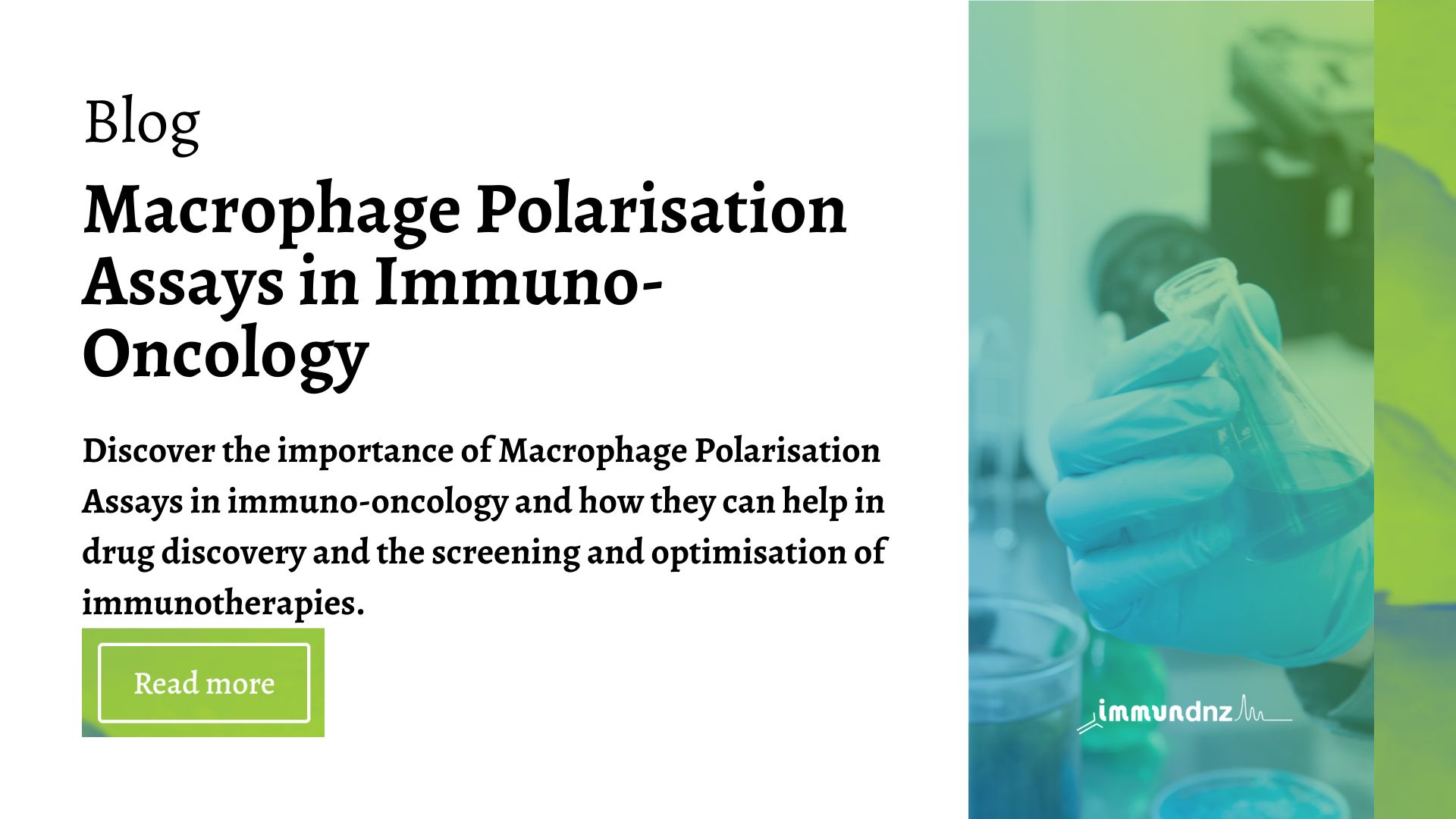In the field of immuno-oncology, harnessing the body’s immune system to combat cancer has emerged as a promising therapeutic approach. Macrophages, key players in the tumor microenvironment, exhibit diverse phenotypes known as polarization states, ranging from pro-inflammatory M1-like to anti-inflammatory M2-like phenotypes. The balance between these polarisations profoundly influences tumor progression and therapeutic responses. This introduction delves into the significance of macrophage polarisation assays in immuno-oncology drug discovery, elucidating how they guide the development of innovative therapies and shape the future of cancer treatment.
Understanding Macrophage Polarisation
Macrophages are versatile immune cells that play crucial roles in tissue homeostasis, inflammation, and host defense. In the context of cancer, tumor-associated macrophages (TAMs) exert dual roles, either promoting tumor progression by facilitating immune evasion, angiogenesis, and metastasis, or exerting anti-tumor activities by inducing cytotoxicity and antigen presentation. The polarization of macrophages into distinct functional phenotypes, primarily M1-like (classically activated) and M2-like (alternatively activated), dictates their effector functions and impact on tumor immunity.
Assessing Macrophage Phenotypes
Macrophage polarisation assays provide a means to characterize the functional phenotypes of TAMs within the tumor microenvironment. By exposing macrophages to various stimuli mimicking the tumor milieu, such as cytokines, chemokines, or tumor-derived factors, researchers can induce specific polarization states and evaluate the resulting phenotypic markers, cytokine profiles, and functional activities. Immunofluorescence, flow cytometry, and gene expression analysis are commonly employed techniques to assess macrophage polarization, enabling the identification of M1-like and M2-like populations and quantification of their relative abundance within tumors.
Targeting Macrophage Polarisation in Cancer Therapy
The dynamic interplay between tumor cells, immune cells, and stromal components shapes the immunosuppressive tumor microenvironment, fostering tumor immune evasion and resistance to therapy. Strategies aimed at reprogramming TAMs from an M2-like, pro-tumoral phenotype to an M1-like, anti-tumoral phenotype hold immense therapeutic potential in immuno-oncology. Small molecule inhibitors, biologic agents, and immunotherapies targeting key signaling pathways involved in macrophage polarization, such as CSF-1/CSF-1R, STAT3, or TGF-β, are actively being investigated in preclinical and clinical studies. Macrophage polarization assays serve as invaluable tools in the screening and optimization of these therapeutic agents, enabling the identification of compounds that modulate macrophage phenotypes and enhance anti-tumor immunity.
Enhancing Immunotherapy Responses
Immune checkpoint inhibitors (ICIs), which unleash anti-tumor immune responses by blocking inhibitory pathways such as PD-1/PD-L1 or CTLA-4, have revolutionized the treatment landscape of various cancers. However, not all patients respond to ICIs, highlighting the need for combinatorial approaches that overcome immune resistance mechanisms and enhance therapeutic efficacy. Macrophage polarization assays offer insights into the immunomodulatory effects of ICIs on TAMs and provide rationale for combination therapies that target both tumor-intrinsic and immune-extrinsic pathways. For instance, synergistic effects have been observed with the combination of ICIs and agents that promote M1-like polarization, such as toll-like receptor agonists or CD40 agonists, leading to enhanced anti-tumor immunity and improved clinical outcomes.
Navigating Resistance Mechanisms
Despite the initial success of immunotherapy, resistance mechanisms often emerge, limiting the long-term efficacy of treatment. Tumor cells can exploit various mechanisms to evade immune surveillance and reprogram the tumor microenvironment towards an immunosuppressive state. Macrophage polarization assays offer a means to elucidate these resistance mechanisms and identify alternative targets for therapeutic intervention. By dissecting the crosstalk between tumor cells, TAMs, and other immune cells, researchers can uncover vulnerabilities in the tumor ecosystem and develop rational combination strategies to overcome resistance and restore anti-tumor immunity.
Translating Preclinical Insights into Clinical Applications
The translation of preclinical findings from macrophage polarization assays into clinical applications represents a critical step in immuno-oncology drug development. Biomarker-driven clinical trials, informed by preclinical data on macrophage phenotypes and therapeutic targets, enable the identification of patient populations most likely to benefit from targeted interventions. Moreover, innovative imaging modalities, such as positron emission tomography (PET) or magnetic resonance imaging (MRI), allow for non-invasive monitoring of TAMs in patients, facilitating the assessment of treatment responses and guiding therapeutic decision-making in real-time.
Conclusion
Macrophage polarization assays serve as indispensable tools in immuno-oncology drug discovery, shedding light on the intricate interplay between tumor cells and the immune microenvironment. By deciphering the phenotypic and functional heterogeneity of TAMs, researchers gain valuable insights into tumor progression, immune evasion mechanisms, and therapeutic vulnerabilities. As we continue to unravel the complexities of macrophage biology and tumor immunology, macrophage polarization assays will undoubtedly play a central role in guiding the development of innovative therapies and personalized treatment strategies that hold promise for improving outcomes in cancer patients.


